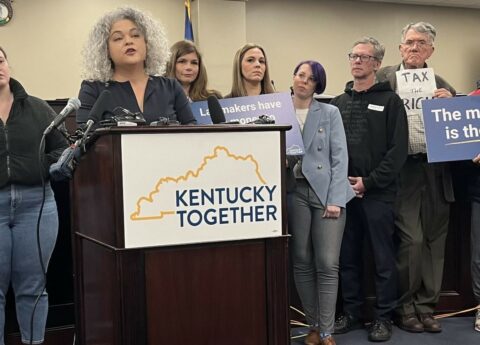A new study released today by the Institute on Taxation and Economic Policy (ITEP) and the Kentucky Center for Economic Policy (KCEP) finds that low-income Kentuckians pay 49 percent more in state and local taxes as a share of their incomes than the state’s wealthiest one percent pay. The rate for moderate-income and middle class taxpayers is 74 percent higher than what those at the very top pay.
“Kentucky’s upside-down tax system requires the least from those who are most able to pay taxes and whose incomes are growing the most rapidly,” said Jason Bailey, KCEP’s Director. “Widening income inequality is the central challenge of our time, and our taxes shouldn’t make it worse.”
The study, Who Pays? A Distributional Analysis of the Tax Systems in All 50 States, analyzes tax systems in all 50 states and factors in all major state and local taxes, including personal and corporate income taxes, property taxes, sales and other excise taxes. Although Kentucky’s taxes are less regressive than most other states’ as a result of individual and corporate income taxes, the family-size credit for people in poverty and some sales tax exemptions, they are still regressive—meaning the higher one’s income, the lower one’s tax rate.
Kentucky’s overall tax system is regressive largely because of sales and excise taxes, which cost 5.5 percent of income for the bottom 20 percent of Kentuckians but only 0.8 percent for the top one percent. Even with exemptions for groceries and other items like prescription drugs, Kentucky’s sales tax is still very regressive. That’s because the lower one’s income, the larger share of income is spent and not saved.
The ITEP report notes that greater reliance on regressive sales taxes and lower taxes on the wealthy and businesses not only make tax systems unfair, but also make it harder for states to adequately fund basic public obligations such as education.
“We’d be in a lot worse shape, both in terms of fairness and the resources we have to invest in education and health, if it weren’t for our income tax,” said Bailey. “Some in Kentucky would like to chip away at income taxes rather than protect them, but the huge recent budget shortfalls and tax shifts away from the wealthy in states like North Carolina and Kansas are showing us just what a bad idea that is.”
Kentucky has the 33st most regressive tax system among the states according to the report, while Texas, Tennessee and Indiana are among the Terrible Ten states with the most regressive tax systems. That’s primarily because Texas and Tennessee lack broad-based individual income taxes and Indiana’s income tax has a lower, flat rate.
“In recent years, multiple studies have revealed the growing chasm between the wealthy and everyone else,” said Matt Gardner, executive director of ITEP. “Upside down state tax systems didn’t cause the growing income divide, but they certainly exacerbate the problem. State policymakers shouldn’t wring their hands or ignore the problem. They should thoroughly explore and enact tax reform policies that will make their tax systems fairer.”
“There are policy options for Kentucky to increase tax fairness and ensure we have what it takes to invest in our children and our economy,” said Bailey. “For instance, legislators could close income tax loopholes and limit exemptions so that Kentucky’s wealthiest residents and most profitable corporations pay their fair share, while also enacting a refundable state earned income tax credit.”
A Kentucky fact sheet is available here, and the full report can be accessed here.
###
The Institute on Taxation and Economic Policy (ITEP) is a 501 (c) (3) non-profit, non-partisan research organization that works on federal, state, and local tax policy issues. ITEP’s mission is to ensure that elected officials, the media, and the general public have access to accurate, timely, and straightforward information that allows them to understand the effects of current and proposed tax policies. www.itep.org.



